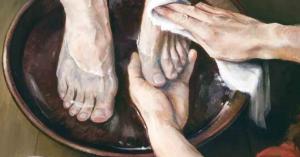
Of the four Gospels in the New testament, I have a particular fondness for the Gospel of John – an account of Jesus’ life written by the disciple he was closest too. It is not a stretch to see John as Jesus’ dearest friend and confidante. It was John who reclined against Jesus’ breast at the last supper, and who leant back into him to ask him a question; it was John was self-refers as ‘the disciple who Jesus loved’; and it was John who remained with Jesus throughout his crucifixion, and to whom Jesus gave care of his own mother. John 19:25-28,
‘Near the cross of Jesus stood his mother, his mother’s sister, Mary the wife of Clopas, and Mary Magdalene. When Jesus saw his mother there, and the disciple whom he loved standing near by, he said to her, ‘Woman, here is your son,’ and to the disciple, ‘Here is your mother.’ From that time on, this disciple took her into his home.’
This was not part of the spiritual battle Jesus was fighting; it was the concern of a dying son for his mother, and for his dearest friend.
There is further evidence of John’s closeness to Jesus in the way he writes. Unlike the other three Gospel writers, he doesn’t emphasise signs and wonders, focussing instead on the words and emotions of Jesus. I take great comfort from John’s perspective, especially in the chapters leading up to the crucifixion. After 12 chapters devoted to the life and ministry of Jesus, John devotes 5 chapters to his words, giving us a unique insight into what was weighing on his mind at that time.
Chapters 13-18 are a deeply personal insight into the things Jesus wanted his disciples to know before his death, so let’s take a look at the priorities of Jesus – the things that captured and continue to capture his heart. See the personal way John writes about Jesus. John 13:1,
‘It was just before the Passover Festival. Jesus knew that the hour had come for him to leave this world and go to the Father. Having loved his own who were in the world, he loved them to the end.’
Jesus’ expression of these emotions was to wash his disciples’ feet – an extraordinary act of service from the Divine to his creation. When Peter understandably objected, Jesus emphasised the importance of the act in verse 8:
Jesus answered, ‘Unless I wash you, you have no part with me.’
This remains true to this day. A life of faith begins and continues with accepting the service of God. It is an ego crusher, yielding to divine love, but it puts us in the right place to serve others. Verse 14-15:
‘Now that I, your Lord and Teacher, have washed your feet, you also should wash one another’s feet. I have set you an example that you should do as I have done for you.’
A life following Jesus is a life of service. We follow his example.
Next he predicts his betrayal – not from a prophetic distance, but with obvious pain, and then does the same for Peter’s upcoming denial and failure. Verse 21 and 37-38:
‘After he had said this, Jesus was troubled in spirit and testified, ‘Very truly I tell you, one of you is going to betray me.’’
…
Peter asked, ‘Lord, why can’t I follow you now? I will lay down my life for you.’
Then Jesus answered, ‘Will you really lay down your life for me? Very truly I tell you, before the cock crows, you will disown me three times!
Why did Jesus reveal these things? My view is that he was preparing them for the awful shock and tragedy they were about to experience. Life was about to get seriously dark, and for these few their hopes and dreams would seem to be snuffed out entirely. Even in the context of this troubling knowledge, Jesus was preparing them for his absence. Verse 33 -35:
‘My children, I will be with you only a little longer. You will look for me, and just as I told the Jews, so I tell you now: where I am going, you cannot come.
‘A new command I give you: love one another. As I have loved you, so you must love one another. By this everyone will know that you are my disciples, if you love one another.’
In Chapter 14, Jesus offered comfort to his disciples, warning them once again that they couldn’t yet follow him to where he was going, but assuring them that his absence would not be the end of their relationship with him. Verses 1-3:
‘Do not let your hearts be troubled. You believe in God; believe also in me. My Father’s house has many rooms; if that were not so, would I have told you that I am going there to prepare a place for you? And if I go and prepare a place for you, I will come back and take you to be with me that you also may be where I am.’
Jesus’ concern for his disciples flows from every word:
- He wants them to have some understanding of what was to come, so that they were not taken completely unawares. This is an expression of the heart of God in his dealings with us today. Life has its torments and tragedies, and he would have us cling to the knowledge that rejoicing comes in the morning. The New Testament is loaded with wisdom about how to approach trials and suffering, which for me are an echo of Jesus’ compassion and concern for his disciples in the run up to the greatest hardship of their lives. In my own life, I’ve drawn deeply from the overflowing compassion and comfort of God in times of trouble.
- He even prepares them for their own failures. When morning came, and Peter heard the cockerel crowing, he must have sunk to the deepest and darkest state of self-recrimination. It should be no surprise that the Gospel of John ends with the reinstatement of Peter, on meeting the Lord by the shores of Galilee, where he’d first met and given his life to Jesus. Above all else, our God is a God of grace, forgiveness, and reconciliation. He is the God of endless chances to respond to love.
- He urges them to focus on love, giving them a new commandment to hold to even in dark and troubling times. This too, is the very heart of God for us today. How well do we hold to it? How well do we love those around us and in our congregations? Are we wed to gossip, slander, factions, envy, and division, or do we fall in line with God as he builds his church, preparing it to tear down the very gates of Hell?
- He shows them what service looks like and calls them to do the same. Love and service are the glue that binds us together. They are our greatest spiritual discipline.
I’m going to write a post on the ongoing chapters of John leading up to Christ’s crucifixion every day over Easter weekend, to search out the heart and priorities of Jesus, and consider how they apply today.












